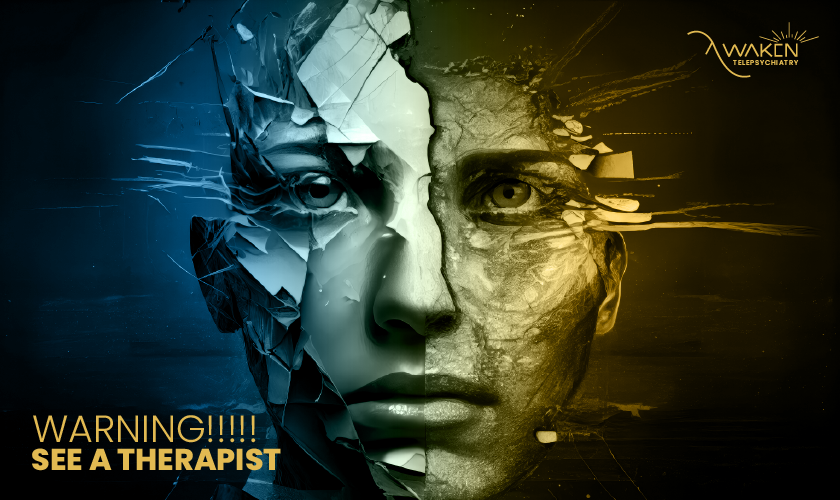Taking care of our mental health is so important – yet, many of us tend to neglect it, not realizing when professional help is needed. If you want a mental health service, click on our mental health service.
Oftentimes, we can be unaware of our condition, or it can be hard to accept if we truly need the help we require.
We will talk about seven warning signs in this blog post that could mean it’s time to see a therapist.
If you’re experiencing these signs yourself or you suspect someone close to you could benefit from therapy, then understanding these signs can help you find the path toward healing and growth.
When You Should See a Therapist
1. You’re experiencing overwhelming and persistent emotions.
If you find yourself constantly overwhelmed by emotions such as sadness, anxiety, anger, or hopelessness, and your mood feels off most of the time – it can be a sign that getting therapy would be beneficial.
Reoccurring and intense emotions that affect your daily life, relationships, and health can indicate underlying issues that a therapist can help you address.
2. You’re having difficulty coping with challenges.
Life throws different challenges our way, but if you find it more difficult to cope and struggle with everyday stressors, therapy can offer the support you need.
A therapist can help you navigate these challenges, build resilience, and develop healthier coping mechanisms to deal with situations.
3. You’re engaging in unhealthy coping mechanisms.
Negative and self-defeating thoughts can lead a person to adopt unhealthy coping skills.
If you have coping mechanisms like substance abuse, addictive behaviors, binge eating, self-harm, oversleeping to escape problems or isolating yourself from the people you love – these can be the “red flags” that mean you need therapy.
Seeking therapy is important because it can identify the root causes behind these behaviors and help you develop healthier alternatives.
4. You have strained relationships.
It’s challenging to maintain healthy relationships when you’re not feeling the best. If you notice a consistent pattern of strained or damaged relationships in your life, therapy can be beneficial.
Struggling in maintaining healthy connections, having frequent conflicts, or feeling isolated and disconnected from people can mean that you have unresolved emotional issues.
Therapy can also improve communication skills – which is important to build healthier, more secure and more fulfilling relationships.
5. Your sleep patterns are disrupted.
Sleep disturbances, changes in appetite, unexplained physical symptoms (e.g., headaches, stomachaches), or chronic fatigue can mean that you have signs of underlying emotional distress.
Your psychological health can take a toll on your overall health and these symptoms can sometimes stem from mental health issues.
Therapy can help you uncover the emotional factors contributing to these physical symptoms.
6. You’re feeling stuck and hopeless.
If you find yourself feeling stuck, directionless, or lacking motivation in everything, therapy can provide you with guidance and support.
A therapist can help you explore your values, goals, and aspirations, helping you in finding clarity, purpose, and a path toward personal growth.
7. You’re reliving past traumas.
Experiencing a traumatic event can have a long-lasting effect on a person. If you think you’re experiencing flashbacks, or struggling with PTSD symptoms, you might want to speak to a therapist.
A therapist can help you process and heal from these experiences, leading you to reclaim control over your life.
Finding the Best Therapist for Young Adults Near Me
- Research Therapists – Look for therapists who specialize in young adult mental health.
- Get Referrals – Ask for recommendations from trusted sources (your family and friends).
- Check Online Directories – Check directories to search for therapists specializing in young adults.
- Read Reviews and Testimonials – Gather insights and feedback from past clients’ feedback.
- Consider Compatibility – Consider things like gender preference, cultural sensitivity, and therapeutic approach.
- Verify their Credentials – Confirm proper qualifications, licensure, and certifications.
- Meet the Therapist for Initial Consultation – Schedule a meeting to assess connection and comfort with the therapist.
How To Talk to Someone
It’s important to reach out for help if your distress lasts longer than two weeks. One-on-one psychotherapy is beneficial.
Speaking to a mental health professional doesn’t mean weakness but rather shows the strength to acknowledge that you don’t have all the answers.
It’s not necessary to see a therapist in person if you prefer online therapy.
Awaken Telepsychiatry provides an alternative to in-person sessions, allowing you to connect with a therapist through messaging, phone, or video conferencing.




No comment